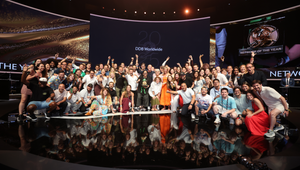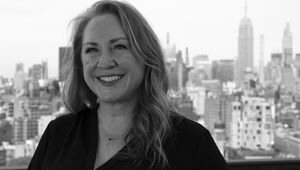
DDB’s Roisin Rooney on the Universal Human Truths at the Heart of the Talent Crunch

Roisin Rooney is a self-described ‘DDB lifer’. The global chief people officer for the iconic advertising network has become a keystone for talent across the agency offices around the world. Over the course of four decades, Roisin has helped to nurture thousands of careers, growing and developing countless programmes, platforms and strategies, whether it’s diversity, equity and inclusion initiatives, training solutions or developments to support and retain talent. And at the time of one of the most intense talent wars the industry has ever seen, Roisin’s experience and insight is more crucial than ever.
But it almost ended up very differently. When Roisin first began her working life, she entered thinking a career in PR lay ahead. Something wasn’t clicking and this lifelong journey looked like it was about to end before it had even started. But thanks to the ‘freedom to fail’ - what she’d later learn is one of the four key ‘freedoms’ that underpin the network’s culture - Roisin was able to find her true calling in people and culture, moving to BMP, the agency that would later become DDB London.
“It was a happy accident that saw me move over to what was BMP in those days. I felt so blessed and lucky to have gotten through the doors of such an incredible shop filled with the most iconic people who were genuinely nice,” says Roisin, who joined at the time that the incomparable John Webster was creative director. “It felt like home the minute I went in. You worked hard but you really played hard as well. There was a sense of belonging and accomplishment in what you were creating.
“Culture creates that true stickiness. What I’ve been grateful for at DDB is the evolution of being able to continue to map and grow into different roles and continue to be challenged. And, ultimately to do something that I believe in, because I think you have to be credible in a role like this. That’s what’s led me to DDB and the pathway that’s kept me here for those 30 plus years.”
Right now, the whole industry is facing a ferocious battle for talent. The pandemic has seen talent question their career, and the experience of working from home has seen people demand more in terms of work-life balance. Given the breadth of Roisin’s experience, she takes a long view of this, suggesting that agencies and holding companies need to go deep and address the root causes of the issue rather than grasping for quick fixes.
“What’s really interesting is if you map where you see the highest levels of turnover, the real insight is it’s aligned to where employer-employee relationships are very transactional. Before rushing to create solutions, it’s about understanding the root cause that is driving people to feel the need to leave their jobs. The pandemic has crystallized it and caused us all to pause for thought, thinking about what we want. As we come out of this, we’re all tired. We’re reflecting on how we want to live and work in the future,” reflects Roisin. “For us organizationally, one of the key learnings has to be the move from any sense of a transactional relationship. In DDB, we talk very much about wanting a really positive emotional relationship, where people can have a true sense of belonging. And belonging shouldn’t just be in a local agency. We want that kind of emotion at scale, because we want people to feel it across our entire network – connectivity and community.”
Understanding those emotional needs at scale isn’t an easy thing to pull off - but one of Roisin’s proudest achievements is the biannual employee survey that sees 85% of the whole global network share their thoughts about their workplaces. It’s voluntary for employees to participate, which makes that 85% figure impressive, but leadership in local offices have to engage. That means that there’s no hiding if leadership isn’t nurturing the culture or living up to the values of the agency.
One upside of the pandemic experience is that, while people have missed the camaraderie of the office and events and shoots, it has freed people up to connect with further flung colleagues in other countries and continents. It’s also brought the overwhelming importance of community into sharp focus.
“What the pandemic has enabled is a sense of connectivity through screens - and that’s really important for people. As we go forward, it’s our role to ensure that everyone is feeling valued beyond pay. It’s easy to move for money. But if you ask the right questions, what you’ll find is people are really looking for a sense of purpose, connectivity and equality of opportunity.”
While the pandemic paused many in person development solutions, the network still worked hard to nurture the wellbeing of its talents while sustaining culture when it pivoted to work from home, shifting to what it called ‘DDB Everywhere’. “As we emerge, we will be continuing to provide developmental solutions both online and offline, knowing that top talent in every market is going to where their needs are best met.”
Roisin jokes that she’s ‘probably one of the best trained people in the network.’ The nature of her mission to create solutions for people trying to acquire brand new skills or tackle problems in wholly original ways means that Roisin and her teams need to be right up at the frontier of the evolving industry, if not way beyond it. “What’s really important is to be constantly curious,” she says, “I think all of us in the industry are curious. You have to stay up to date with what’s going on. I see every conversation as a learning interaction and an opportunity. I’m really grateful that DDB is a network where you can achieve more than you ever imagined.”
Thinking about it, Roisin reflects that that challenge is crystallised in the network’s positioning ‘Unexpected Works’, launched by CEO Marty O’Halloran last year. “All the best solutions are the untried ones,” she says. “So having that freedom to jump in and know that when you do, you’re not going to be blamed for something, you’re going to be recognised for your contribution. It’s a safe environment to knock around those ideas. I think that’s got to be at the core of it, to make people feel empowered.”
Navigating these new challenges and empowering talent to navigate them may be a daunting task, but Roisin does have if not a map, then a compass. The Four Freedoms - inspired by DDB hero Phyllis Robinson, one of the original trailblazing creative talents of the agency and developed by DDB’s Chairman Emeritus and Advertising Hall of Famer Keith Reinhard - form the core of Roisin’s culture and talent strategy as well as a guiding star for the network’s leaders. These are the freedom from fear (a healthy creative environment where people won’t be judged for taking ideas to unexpected places); the freedom to fail (the understanding that not everything succeeds first time round and that failure can become a catalyst for a brilliant new idea if you can stay resilient); the freedom from chaos (clear expectations and accountability to ensure talent doesn’t have to worry about unnecessary drama); and freedom to be (a key tenet of the agency’s DE&I strategies and a particularly important freedom as the agency emerges from the pandemic and looks to the future).
On DE&I, DDB like every network is on a journey. What makes the network somewhat unique, though, is its history. From its inception, DDB was an outsider on Madison Avenue thanks to its Jewish roots - and instead of trying to assimilate, the agency leaned into its heritage.
‘I think they had to live it,’ says Roisin. “If you go right back to that Mad Men era, they were known as the Jews on Madison Avenue. They were doing work that was radically different. They broke out of the WASP culture at the time. We’re far from perfect on our journey but we’ve been on it for a little bit longer.”
And, of course, that journey isn’t linear. Being a global network, the specific contextual pressures and needs around DE&I can appear quite different in different cultures. Therefore, those freedoms and the behaviours form a flexible framework where employees are encouraged to tailor strategies to the needs of their own market.
“We’re headquartered in the US but have really strong regional leadership who are proud of their agencies. They really do use their voice to say, ‘don’t give us a one-size-fits all solution, help us understand and deliver market-to-market what works’,” says Roisin. “It’s about creating that framework but with the flexibility for that cultural nuance and understanding to be leveraged. Then our agencies work out and activate what’s appropriate for them.”
Of course, despite the increasing need for nuance and the unavoidable complexity of navigating some of the biggest talent challenges to hit the industry at a global level, Roisin believes that, at core, there are universal human truths that stand the test of time.
“When it comes to those core principles, they absolutely remain the same,” she says. “We have to remember that we’re all human beings hired by somebody, somewhere to do a job and sometimes in the pursuit of new trends we can forget or lose sight of the necessary. As individuals, we all want to be treated with respect and have equal opportunities to succeed. If we get those elements right, then we build up trust cultures. And if we have trust cultures, that’s where you can really see people flourish and when individuals get to do the best work of their careers.”















